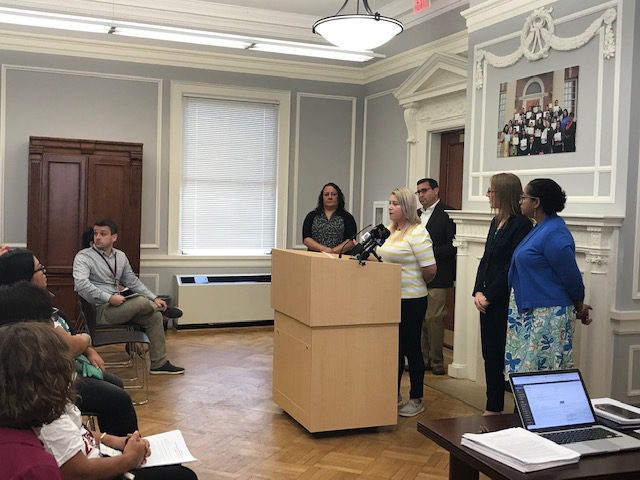For Immediate Release September 16, 2019
Contact: Lucy Bradlow, Glover Park Group, [email protected], 202-295-0178
CASA, 240-706-2624
New Lawsuit Argues Trump Administration’s “Public Charge” Rule Is Unconstitutionally Vague
Georgetown Law’s Institute for Constitutional Advocacy & Protection and CASA Seek Court Order Preventing Department of Homeland Security’s New “Public Charge” Rule From Going Into Effect.
[Greenbelt, MD] — CASA, a D.C.-area immigration non-profit, and two of its members have challenged a new rule issued by the Department of Homeland Security (DHS) that would give nearly unfettered discretion to immigration officials to deny green cards to low-income immigrants based on speculation that the person may, at some point over the course of a lifetime, temporarily receive a small amount of certain public benefits and thereby become a “public charge.” The plaintiffs are represented by attorneys at Georgetown Law’s Institute for Constitutional Advocacy and Protection (ICAP), who argue that the rule upends a century of interpretation of the term “public charge” to apply only to those noncitizens likely to become permanently and primarily dependent on the government for their basic needs.
The case is the first in the country to challenge the Trump administration’s new rule on behalf of individuals impacted by its unprecedented definition of “public charge.” Both of the named individuals came to the United States as young children and later applied for and received protection under the Deferred Action for Childhood Arrivals (DACA) program, which they maintain today. Although both currently are enrolled in college, employed, and supporting themselves, they are concerned about how the vague provisions of the new public charge rule could harm their efforts to become Lawful Permanent Residents (LPRs) in the future.
“The new rule would allow immigration officials to deny LPR status to many immigrants in an arbitrary and discriminatory way,” said Amy Marshak, Senior Counsel at ICAP. “This is by design. President Trump and his advisors have expressed animus toward non-white immigrants, and studies already have shown that the new rule will disproportionately affect immigrants of color.”
The new rule requires immigration officials to assess and weigh certain factors as “positive” or “negative” in the determination of whether a person applying to adjust to LPR status (and thereby obtain a green card) is likely to become a public charge. If an immigration official determines that a person is likely to receive more than 12 months of certain public benefits— including food, housing, and healthcare benefits—out of any 36-month period at any point in the person’s lifetime, the official may deem the person likely to become a public charge.
“The new rule would expand the concept of a ‘public charge’ beyond recognition, making someone who receives little more than $1500 in food stamps or a few benefits at the same time for less than a year into a ‘public charge,’” said ICAP Counsel Jonathan Backer. “That is not what anyone has ever understood the term to mean.”
“We at CASA are already experiencing the negative effects of this new rule,” said George Escobar, CASA’s Chief of Programs and Services. “Our members have stopped accepting or refused to apply for public benefits for themselves and their family members, including their children, because of fear that receiving any benefits will harm their ability to stay in the United States. This harms not just these families, who use these benefits to supplement their incomes and support their health, well-being, and stability, but also the broader community.”
The lawsuit is the first in the country to challenge the rule under the due-process component of the Fifth Amendment to the U.S. Constitution. With the new rule’s low threshold of benefits use, confusing medley of factors, and undefined weighting scheme, the rule is so vague as to deprive non-citizens of fair notice of what might render them likely to be deemed a public charge; and the rule gives virtually unbridled discretion to immigration officials making that inherently speculative determination. The lawsuit also argues that the rule unconstitutionally discriminates against non-white, non-European immigrants and that it was promulgated in violation of the Administrative Procedure Act.
CASA and its members also filed today a motion for a preliminary injunction to stop the public charge rule from going into effect as planned on October 15, 2019, while its lawsuit is pending. DHS issued its final rule on August 14, 2019, about ten months after issuing its notice of proposed rule making in October 2018. The agency received over 260,000 comments in response to the proposed rule, the vast majority of which were opposed to it.
About the Institute for Constitutional Advocacy and Protection (ICAP) ICAP
uses the power of the courts to defend American constitutional rights and values. Based at Georgetown Law Center, ICAP draws on expert litigators, savvy litigation strategy, and the constitutional scholarship of Georgetown to vindicate individuals’ rights and to protect America’s constitutional way of life. More information about ICAP can be found at law.georgetown.edu/icap.
About CASA
With over 100,000 members across the states of Maryland, Virginia, and South Central Pennsylvania, CASA is the largest member-based Latino and immigrant organization in the midAtlantic region. CASA organizes with and litigates on behalf of low-wage immigrants. More information about CASA can be found at www.wearecasa.org and on Twitter at @CASAforall.

